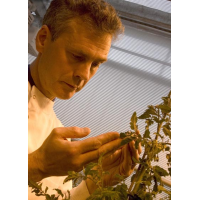Funds for green ideas

Two Lancaster University projects have been awarded prestigious grants by the Natural Environmental Research Council.
Technology to test polluted air and a technique for producing pesticide free fruit and vegetables have both been awarded funds totalling in excess of £100,000.
The air pollution test kit and a plant-based alternative to insecticide were developed with the Departments of Environmental and Biological Sciences, together with the Enterprise and Business Partnerships Team based in the Lancaster Environment Centre at Lancaster University.
The money will now enable them to explore the ideas further with a view to turning them into commercial products.
The NERC follow on fund is designed to help demonstrate the commercial potential of ideas arising from Research Council funded research. It provides financial support at the very early or pre-seed stage of turning research into a commercial proposition
Lancaster University scientists received two of only three Follow On Fund grants to be awarded by NERC this year across the UK.
The awards:
Kevin Jones, Professor of Environmental Chemistry and Ecotoxicology, has been awarded £59K to develop a device, which tests pollution levels in the air. Researchers in the department use the device – known as a passive air sampler – in their pioneering research, tracking and testing persistent organic pollutants (POPS) in the atmosphere.
Air monitoring for POPs has conventionally been conducted at a very limited number of sites using ‘active’ or high volume air samplers. These are expensive around. £10,000 per sampler, they also require electricity and a trained operator.
Professor Jones said: “National and international developments such as EU air quality regulatory standards means there is a market for cheaper more easy to operate air samplers such as those used by the university.
The funds will enable to department to optimize the design of the sampler, carry out market research and accredit the laboratories before the samplers are manufactured for commercial use.”
Dr Nigel Paul, Senior Lecturer in Ecology, has been awarded £53K to explore the commercial potential of a novel method of using a natural plant product as an alternative to pesticides. The award is in collaboration with other researchers at Lancaster, including Dr Jason Moore who is supported by a research fellowship from the Horticultural Development Council.
Pest attacks, which result in major losses of crop productivity, are kept under control by application of pesticides or bio control agents. This idea will stimulate the plant’s own resistance mechanisms without the need for artificial pesticides.
Dr Paul said: “In Europe consumers increasingly expect residue-free products, especially in fresh-food sectors, such as fruit and vegetables. There is increasing commercial pressure for the production of crops with reduced inputs of chemical pesticides. This proposal addresses that commercial need through the application of fundamental knowledge of plant defences against insect attack building on both our past NERC funding and effective links with the horticulture industry through Dr Moore’s fellowship”